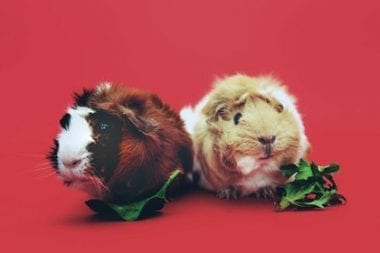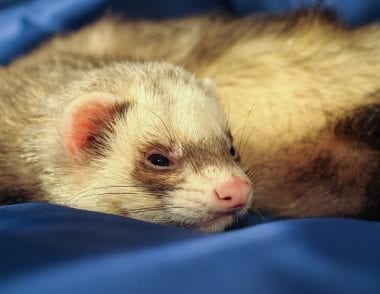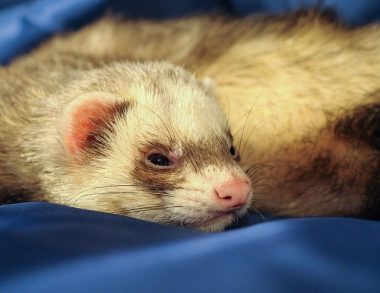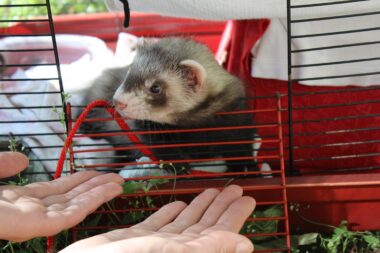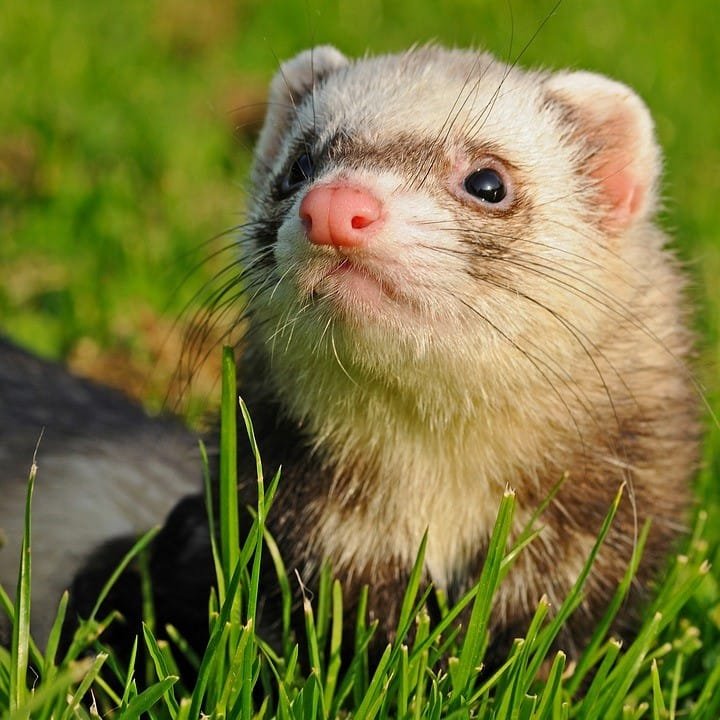
Ferrets, also known as fitchets, is a domesticated animal belonging to the weasel family. These small, furry creatures are known for being very smart and inquisitive in nature and are very popular as pets. Ferrets are truly adorable and often become dependent on human beings for their care and survival. With a lifespan of five to ten years, they are very good for children since ferrets are very social and friendly. They can be trained to use a litter box very easily, just like cats and dogs.
What do ferrets eat?
When keeping ferrets as pets, it is essential to know their diets. So what do ferrets eat? They are strictly carnivorous in nature, thus, their diet is restricted to mostly meat. Vegetable protein and carbohydrates can seriously affect the health of ferrets. So, it must be ensured that the ferret’s diet has a protein content between 32 and 38 percent and fat content between 15 and20 percent.
Raw meat is a good option for their diet. The various raw meat that ferrets can consume are as follows:
● Chicken
● Lamb
● Rabbits
● Pigeons
● Minced beef
among various others.
It should be kept in mind that raw meat is only a part of their diets. Along with the muscle meat, ferrets also consume the liver, intestinal tract, kidneys as well as bones.
Although pet owners might not like feeding raw meat to their pet ferrets, it should be included in their daily meals as it helps ferrets meet their nutritional needs. Only good quality meat should be bought so that the ferret does not accidentally consume any preservatives which might cause them serious harm.
What do ferrets eat apart from raw meat?
Ferrets require animal products that have high protein and fat content. These should be low in carbohydrates and fiber, Whole prey can also be given apart from other raw meat products. These include mice, chicks, and rats.
The prey should only be bought from retailers who sell high-quality rodents to maintain the ferret’s health. Pet owners must not try to catch the rodents by themselves as they might contain parasites that can even kill ferrets.
Ferrets can also be fed with dried ferret food that is made of high meat protein. However, dried food should be avoided if they are rich in fiber and carbohydrates.
Homemade food is also a good option. Raw or cooked chicken along with pellets can be given to ferrets as a replacement for other meats. Chicken baby food can be given if pellets are not available. In case the ferrets do not have a balanced diet, supplements can be given as well. However, the pellets should not be sharp and that dry food is definitely a part of your pet ferret’s daily meals to keep their teeth clean.
Kitten food as substitutes
In cases where good quality raw meat or prepackaged ferret food is not available, high-quality commercial kitten food can be bought. The reason is they are rich in meat protein content. To ensure a balanced diet, fatty acid supplements should be given to the ferrets at a constant rate to ensure that all their dietary requirements are fulfilled.
Cat food, however, should be avoided since they do not contain the same level of proteins as the kitten food. Pet owners should always check the ingredients of the kitten food to avoid feeding their ferrets anything that can cause any harm.
How many times do ferrets eat in a day?
Most ferrets usually have 8 to 10 tiny meals every day. This is because of their high metabolic rate and a very short intestinal tract. Therefore, owners should ensure that their portions are small so that they do not fall sick.
Since ferrets love to eat, serving large portions for their meals can be detrimental because they start to hide the excess food for later on. This can cause food poisoning as raw meat gets spoiled when left open for some time.
For owners who stay away from their pets for a long time due to work, some ferret kibble should be left out so that the ferret does not go hungry. In such situations, raw meat should be avoided to maintain the pet’s health.
How to maintain their dental hygiene
To keep their teeth clean, ferrets may be given raw meaty bones which are of human-grade once a week. It is however important to remember that pet meat products should be avoided as they often have different preservatives that can cause harm to the health of the pet. Human grade raw meat or raw meaty bones are thus, the most appropriate food choice.
There are various other things that should be kept in mind while feeding ferrets with bones. Pet owners should make sure to never feed cooked bones as they may cause internal damage or obstruct the intestine due to splintering. The raw meaty bones should not be very small so that the ferret cannot swallow the bone whole to prevent any harm.
In order to know whether raw meaty bones can be given to your ferret, it is best to check with a vet. It might be difficult for many ferrets to chew on raw bones if they are suffering from dental diseases.
Special considerations for baby ferrets
In case one decides to adopt a baby ferret, its diet should mainly contain a combination of fresh raw meat along with goat or low lactose milk and an adequate quantity of water. They should be three to four times a day.
Since ferrets tend to be fussy eaters, it is very difficult to change their eating habits once they are older. Hence, pet owners should make it a habit to give a variety of food when the ferrets are young. This is to avoid problems in case a particular brand goes out of stock or changes its ingredients. Soft foods, like baby food that are high in meat protein or dried ferret food soaked in water, should also be given occasionally. It is to ensure that they do not reject them when they are ill and unable to have a normal diet.
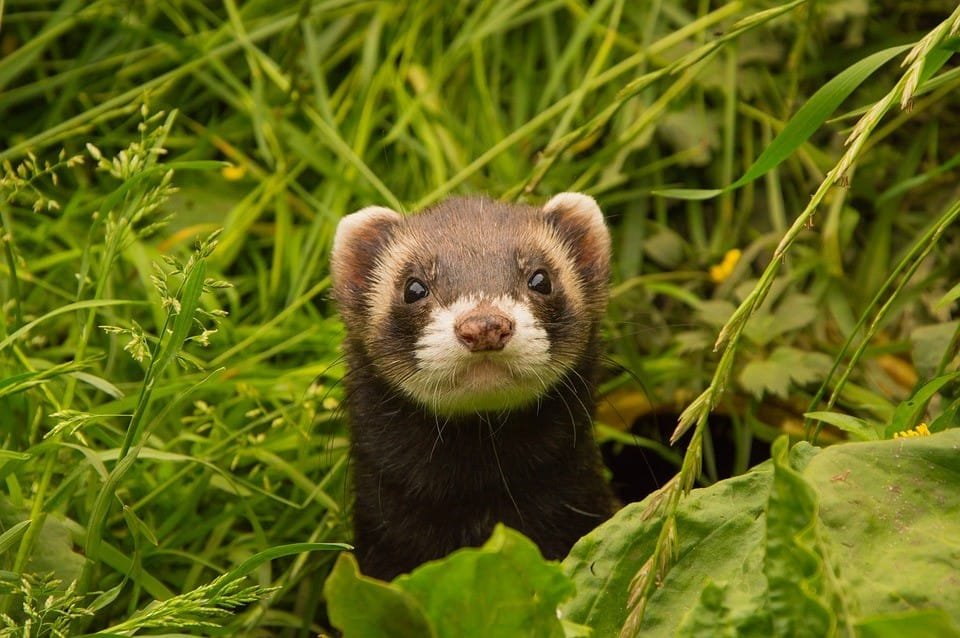
Ferrets love treats
Just like dogs and cats, ferrets adore treats. They can be given small pieces of meat, cat treats high in meat protein, and cast-off pieces of butchered meat like the different organs that are usually thrown away. The meat can be cooked in order to prevent any possibilities of illness.
Raw or cooked eggs can also be given once or twice a week as a treat. Eggs should not be given frequently to prevent constipation. Baby food with a high meat content can also be given as long as they are devoid of sweet, complex carbohydrates and daily products.
While treating ferrets, one should be careful that the treats should be in small quantities. They should not contain any complex carbohydrates and should be either specifically made for ferrets or made for cats. Dog treats, ice cream, and chocolates should be strictly avoided because they can make ferrets fall ill very easily.
Water
Fresh and clean water should be available at all times for the ferrets to drink from. Filtered tap water is also fine and does not negatively affect their health. Ferrets should be provided with lots of water daily to prevent dehydration, particularly during summers or if their diet consists of dry food.
Foods to be avoided
We had started with the question, what do ferrets eat. Now that we know about their diet, it is essential to also know what foods that ferrets cannot have. Fruits and vegetables should be avoided as they are high in complex carbohydrates and fiber. Foods containing corn and grains should also not be given as they often cause digestion problems. Sugar substitutes should also not be included in their diets as they often lead to diseases like bladder stones and ulcers in ferrets.
Things to be kept in mind when adopting these furry friends
Now that we have the answer to what do ferrets eat, pet owners should ensure that their ferrets exercise regularly to prevent them from getting fat. Ferrets are very inquisitive in nature. They should be kept away from any hazardous objects that they can chew and swallow as they might cause intestinal obstruction.
The diets of ferrets should not be changed drastically as they can cause diarrhea and even digestive upsets. Hence, to ensure that it is less upsetting for your ferret, a gradual adjustment should be followed.
Ferrets have a habit of digging, and they are fond of digging out their food, more so if the bowls are completely filled. So, food and water bowls should be deep enough so that they do not spill their food while digging. Filling up the container to the brim should also be avoided.
Finally, hairballs are very harmful to a ferret’s health, and thus treats that prevent the development of hairballs should be included in your ferret’s daily diet to ensure its good health.

